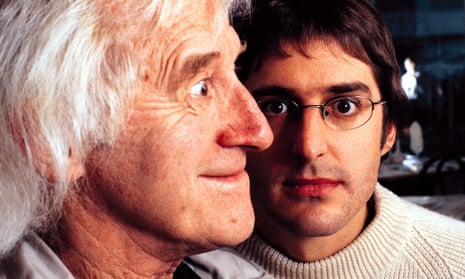Louis Theroux is cycling in circles in a furniture-free room in his house. “Come and look at my exercise bike,” he calls out to Jimmy Savile, who’s visiting. Then they’re sitting in the garden together. Jimmy – wearing skimpy shorts, string vest, gold plastic mirror glasses and inevitable cigar – is playing the guitar. Time for Jimmy to go now. “If you ever do need a place to crash in London, you’ve seen you’ve got a room upstairs,” says Louis, at the door. “I’m serious,” he adds, looking it. Jimmy walks out, backwards.
The footage was taken in 2001, the year after the famous documentary When Louis Met Jimmy. They’d stayed in touch, Louis says, because he thought there was a side to Jimmy he hadn’t seen. There was; he didn’t see it. Now he’s made another documentary Louis Theroux: Savile (BBC Two, Sunday) – no chummy first names now – that sets out to try to understand how he, and everyone else, failed to see it, and how Savile got away with rape and child abuse on a massive scale for so long.
Louis goes to visit victims, and people who worked closely with Savile. He offers to take his shoes off, politely listens to their stories, to build up a picture of how the man was and is perceived. He gets a range of responses. Brutal frankness and sickening detail from Kat, who was abused by Savile at her boarding school for troubled teenage girls. Blind denial from Janet, who was his assistant for nearly 30 years, and still somehow maintains his innocence. Something in between and strange from Sylvia, who worked with him at Stoke Mandeville and who accepts his guilt but still keeps a (discreet) photo of him on the dresser as well as fond memories in her heart.
And from Sam, who was abused by Savile in church, during services, Louis gets more gruesome details, as well as wisdom and magnanimity. Then she goes from interviewer to interviewee: “Do you feel like you were groomed?” she asks Theroux. No, because he wasn’t abused, he says. “Mentally groomed,” she says. “He mugged you off.”
And it is a lot about Louis too, and his own sense of failure for not recognising what Savile was. He searches his own conscience, and looks back at his old material, both broadcast and not, looking for clues. And they’re there, in spades, clear shiny spades in the bright light of hindsight: Savile’s inappropriate behaviour, the clothes, the creepiness, the invasion of personal space, the rumours, his own hints, the alarming personality change when he thought he wasn’t being filmed and let the facade fall.
I don’t think Louis needs to beat himself up too much about it, though. Yes, he did get mugged off, as Sam says. But then so did everyone else – the BBC, Stoke Mandeville, all the other institutions Savile worked with, the press, the establishment, you, me, society, all guilty. (Maybe the BBC more so, not just mugged off, but negligent, as has pointed out.)Somehow – incredibly, appallingly – Savile used his celebrity and his influence, his connections, his charity work, his instinct for vulnerability and choice of victims, the times he operated in, his eccentricity, that bloody cigar – to put up a thick smoke screen, and get away with it until after his death.
Maybe part of Louis’s self-flagellation and shame is a kind of device for the film, I don’t know. And the friendship thing I also don’t see, it doesn’t quite ring true. It’s the other reason they’d stayed in touch, after the original documentary, Louis had come to see Savile as “something like a friend”.
But then friendship comes up when he’s talking to Janet the PA. She says Savile didn’t really do friendship. “In a way friendship is a two-way relationship and he wanted one-way relationships,” offers Louis. So was his own sort of friendship, with Savile, another lie, another mugging? It doesn’t really look like what I understand by friendship, the two of them sitting in the garden of Louis’s house in 2001. More like the professional interest of a documentary maker with a curiousity for human psychology and the out of the ordinary.
Anyway, whatever, that doesn’t really matter. What does is that the new film is extraordinary. The original, When Louis Met Jimmy, was awkward and creepy. (Creepy then; with that hindsight spotlight on it it now looks much worse of course – you’ve always got a room upstairs ... Jimmy Savile!) This is braver, bolder, more grown-up, more honest, truer. And seriously uncomfortable.

Comments (…)
Sign in or create your Guardian account to join the discussion